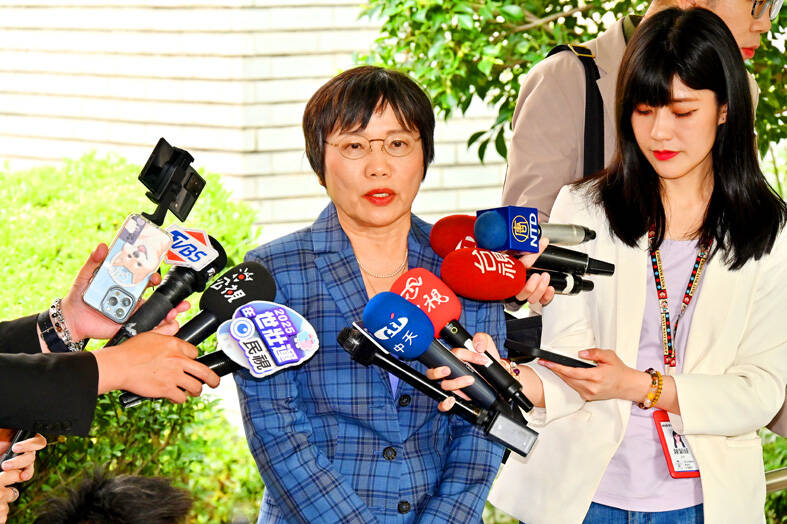The Ministry of the Interior on Thursday launched a new system for tour groups visiting China to voluntarily register their travel dates, itinerary and purpose for safety reasons.
The “Open Platform on Visit Exchange Programs in China” for religious groups and other organizations was launched at https://twexchange.moi.gov.tw/.
The ministry encourages organizations to register their travel information on the platform when visiting China, but registration is not mandatory, Minister of the Interior Liu Shyh-fang (劉世芳) told reporters yesterday.

Photo: George Tsorng, Taipei Times
Voluntary registration would help safeguard the safety of group members and provide the public with greater transparency about when and where such visits are taking place, Liu said.
The registration system is intended primarily for organizations, such as religious groups, business associations and private-sector entities, not individual travelers, she said.
There are no plans for registration to become mandatory, she said, adding that personal privacy and data would be protected in accordance with privacy laws.
The ministry would not monitor or penalize groups that choose not to register, she added.
Taiwan is home to more than 12,000 registered religious groups, but even those that have not formally registered with the government are welcome to use the platform, Liu said.
There are 15 data fields on the platform that would be publicly viewable, including group name, activity detail, travel dates, places and purpose of the visit, Department of IT Service Director-General Huang Kuo-yu (黃國裕) said.
Other details — such as the number of group members, contact person, group leader, phone numbers and emergency contact on the Chinese side — would not be made public, Huang said.
Department of Civil Affairs Director-General Cheng Ying-hung (鄭英弘) said that a separate registration platform would come online soon for elected civil servants traveling to China.
Taiwan has 11,023 such elected representatives, Cheng said.
“We will notify local government offices with instructions on how to register, and also provide the contact information of the dedicated ministry officer for the platform,” Cheng said.
“We shall also send notifications to encourage elected representatives to proactively provide information on their exchanges to China,” he said, adding that they should do so on a voluntary basis, as current laws do not mandate the reporting of such trips.
As for whether the system would monitor “united front” activities by China, Liu yesterday said that any such matters would be handled in accordance with the law.
If there is any involvement in “united front” efforts, including contraventions of the National Security Act (國家安全法) or Anti-Infiltration Act (反滲透法), they would be investigated and dealt with based on the facts, she said.
Asked whether the platform is intended to restrict cross-strait exchanges, Mainland Affairs Council Minister Chiu Chui-cheng (邱垂正) said that as long as the exchanges are based on mutual respect, comply with regulations and are sustainable, they would be viewed positively.
The ministry encourages groups to disclose their travel information through the system so that authorities can remind groups of related risks and ensure they return safely, Chiu said.
He expressed the council’s support for the measure.
Additional reporting by CNA

Taiwan is stepping up plans to create self-sufficient supply chains for combat drones and increase foreign orders from the US to counter China’s numerical superiority, a defense official said on Saturday. Commenting on condition of anonymity, the official said the nation’s armed forces are in agreement with US Admiral Samuel Paparo’s assessment that Taiwan’s military must be prepared to turn the nation’s waters into a “hellscape” for the Chinese People’s Liberation Army (PLA). Paparo, the commander of the US Indo-Pacific Command, reiterated the concept during a Congressional hearing in Washington on Wednesday. He first coined the term in a security conference last

Prosecutors today declined to say who was questioned regarding alleged forgery on petitions to recall Democratic Progressive Party (DPP) legislators, after Chinese-language media earlier reported that members of the Chinese Nationalist Party (KMT) Youth League were brought in for questioning. The Ministry of Justice Investigation Bureau confirmed that two people had been questioned, but did not disclose any further information about the ongoing investigation. KMT Youth League members Lee Hsiao-liang (李孝亮) and Liu Szu-yin (劉思吟) — who are leading the effort to recall DPP caucus chief executive Rosalia Wu (吳思瑤) and Legislator Wu Pei-yi (吳沛憶) — both posted on Facebook saying: “I

The Ministry of Economic Affairs has fined Taobao NT$1.2 million (US$36,912) for advertisements that exceed its approved business scope, requiring the Chinese e-commerce platform to make corrections in the first half of this year or its license may be revoked. Lawmakers have called for stricter enforcement of Chinese e-commerce platforms and measures to prevent China from laundering its goods through Taiwan in response to US President Donald Trump’s heavy tariffs on China. The Legislative Yuan’s Finance Committee met today to discuss policies to prevent China from dumping goods in Taiwan, inviting government agencies to report. Democratic Progressive Party Legislator Kuo Kuo-wen (郭國文) said

The Ministry of Economic Affairs has fined Taobao NT$1.2 million (US$36,900) for advertisements that exceeded its approved business scope and ordered the Chinese e-commerce platform to make corrections in the first half of this year or its license would be revoked. Lawmakers have called for stricter supervision of Chinese e-commerce platforms and more stringent measures to prevent China from laundering its goods through Taiwan as US President Donald Trump’s administration cracks down on origin laundering. The legislature’s Finance Committee yesterday met to discuss policies to prevent China from dumping goods in Taiwan, inviting government agencies to report on the matter. Democratic Progressive Party